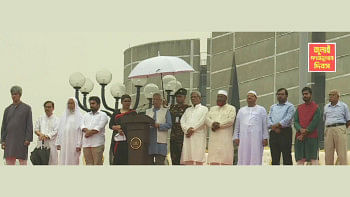TI to help ensure transparency in garment sector

Transparency International will launch a tripartite panel within next year that will ensure accountability and transparency in the garment sector, said a senior official of its Bangladesh chapter.
“If everything goes right, we will be able to come up with the Garment Industries Transparency Initiative in Bangladesh and Myanmar by next year,” said Iftekharuzzaman, executive director of Transparency International Bangladesh (TIB).
“Before the programme kicks off formally, we will hold a regional conference early next year and an international one at the end of the year -- both in Dhaka,” he said in an interview with The Daily Star.
The panel will comprise representatives from ministries concerned, the private sector and civil society, he said.

The labour and employment, and commerce ministries will represent the government, while TIB, the Centre for Policy Dialogue, Brac, Bangladesh Institute of Labour Studies and trade union leaders will come from the civil society. Bangladesh Garment Manufacturers and Exporters Association will lead the private sector in the tripartite body.
“The labour and employment ministry and the BGMEA have already agreed to join the initiative,” Iftekharuzzaman said.
The main objective of the panel will be to monitor business practices of garment manufacturers, retailers and other stakeholders by setting up specific standards that will lead to transparency in the entire sector.
The committee will at first set the yardsticks, he said, adding that the TI has already conducted a feasibility study on Bangladesh's garment sector.
“We will monitor if the garment factory owners and retailers are complying with the rules and laws of the country.” The standards will be based on the rules and laws of the respective countries, he added.
When asked if they have the authority to form such a panel, he said garment is an international business and the Bangladesh government has ratified some agreements with the International Labour Organisation and formulated some laws to protect the rights of workers.
“So we can come up with a panel that will monitor the business practices,” he said, adding that the tripartite committee will encourage garment makers to disclose information on their activities so that transparency is ensured.
The TI also wants Accord and Alliance, two foreign agencies for garment factory inspections in Bangladesh, to join the panel.
The retailers will also have to follow the standards because after the Rana Plaza building collapse they are facing mounting pressure from the civil society across the globe to follow fair business practices.
The panel will initially work in Bangladesh and Myanmar, Iftekharuzzaman said. If the model succeeds in the two countries, it will be replicated in Vietnam, China, Indonesia, Cambodia, Sri Lanka and some African countries in three to five years.
The system is being developed along the line of TI's Extractive Industries Transparency Initiative (EITI), which has been in place in some oil and mineral resources exporting countries. He said the system has yielded positive results as companies and government started sharing information with the public.
Giving an example, he said, people earlier did not know that the Nigerian government earns revenue worth $55 billion a year from exports of petroleum products. "But thanks to the EITI, this is not a secret anymore," he said.
Once the Garment Industries Transparency Initiative is introduced, credibility of Bangladesh's garment business will get a boost globally as the TI will give certificates to compliant factory owners, he said. In absence of proper monitoring, the retailers often source garments from noncompliant factories, Iftekharuzzaman said.
On the generalised system of preferences, he said the US has given a wrong message to the world by scrapping the trade privilege for Bangladesh, as the move has put a negative impact on the garment workers of the country.
The TI initiative will improve governance in the garment sector, he said, adding that the Tazreen Fashions fire and the Rana Plaza building collapse were due to a lack of good governance in the sector.

 For all latest news, follow The Daily Star's Google News channel.
For all latest news, follow The Daily Star's Google News channel. 



Comments